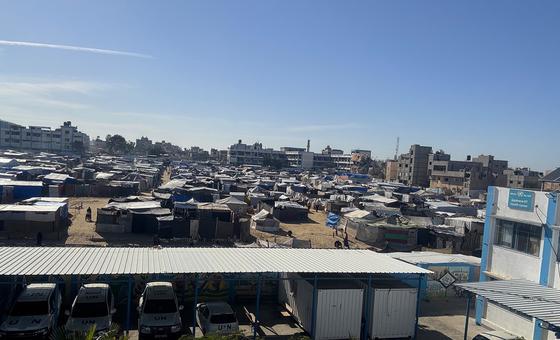
Images taken at the school in Khan Younis showed the apparent impact point of one shell in a concrete upper floor where people had been living at the time of the attack late Sunday night.
According to the UN agency for Palestinian refugees, UNRWA, 13 people died and 48 were injured during the strike. There was no warning, said the victims.
“It’s been another very deadly night here in the Gaza Strip, we are waking up every single day to a new horror,” UNRWA Senior Emergency Officer, Louise Wateridge, told UN News.
“I have been to Nasser Hospital this morning. One of the children I spoke to her name was Mona, 17 years old; she has very severe injuries to her leg – she had very severe shrapnel wounds – and she was in the hospital with her sister…their mother was crushed to death under the rubble.”
Another victim, two-year old Julia, suffered severe head trauma and lost her sight in one eye; her five-year-old brother also had a serious head injury.
Originally from Gaza City, the youngsters and their family “have been forcibly displaced seven or eight times,” Ms. Wateridge said. “They ended up in the [UNRWA] school, and they’ve been there for the last seven months, and now this – it just feels very hopeless.”
Youngsters’ toll
The development followed an update from the head of the UN Children’s Fund, UNICEF, that more than 14,500 youngsters have been reportedly killed in Gaza. Many thousands more are believed buried under the rubble.
Meanwhile, famine “continues to loom in the north” and humanitarian access remains “severely restricted”, said UNICEF Executive Director Catherine Russell, in a post on social media.
“Virtually all 1.1 million children in Gaza are in urgent need of protection and mental health support,” she added, amid media reports that Israeli military activity in the last 24 hours has left at least 69 Palestinians dead, from Beit Lahia in the north to Rafah in the south.
Food aid blocked
Echoing those concerns, the UN World Food Programme (WFP) warned that Gazans were now desperately worried about not getting enough to eat. In the absence of a ceasefire, “we need to find a way of getting all the food that we have outside Gaza in”, said WFP’s Head of Emergency Communications, Jonathan Dumont.
“The devastation is absolutely staggering,” he continued, in an online message from Gaza.
“There’s no electricity or running water or sewage (treatment). Almost everyone has lost their home. A lot of people are living in tents. We have hot meals, distributions…People come and they get really desperate. You can see it in their faces and you can see it in their eyes. To prevent famine we need to find a way to get a consistent flow of food in.”
